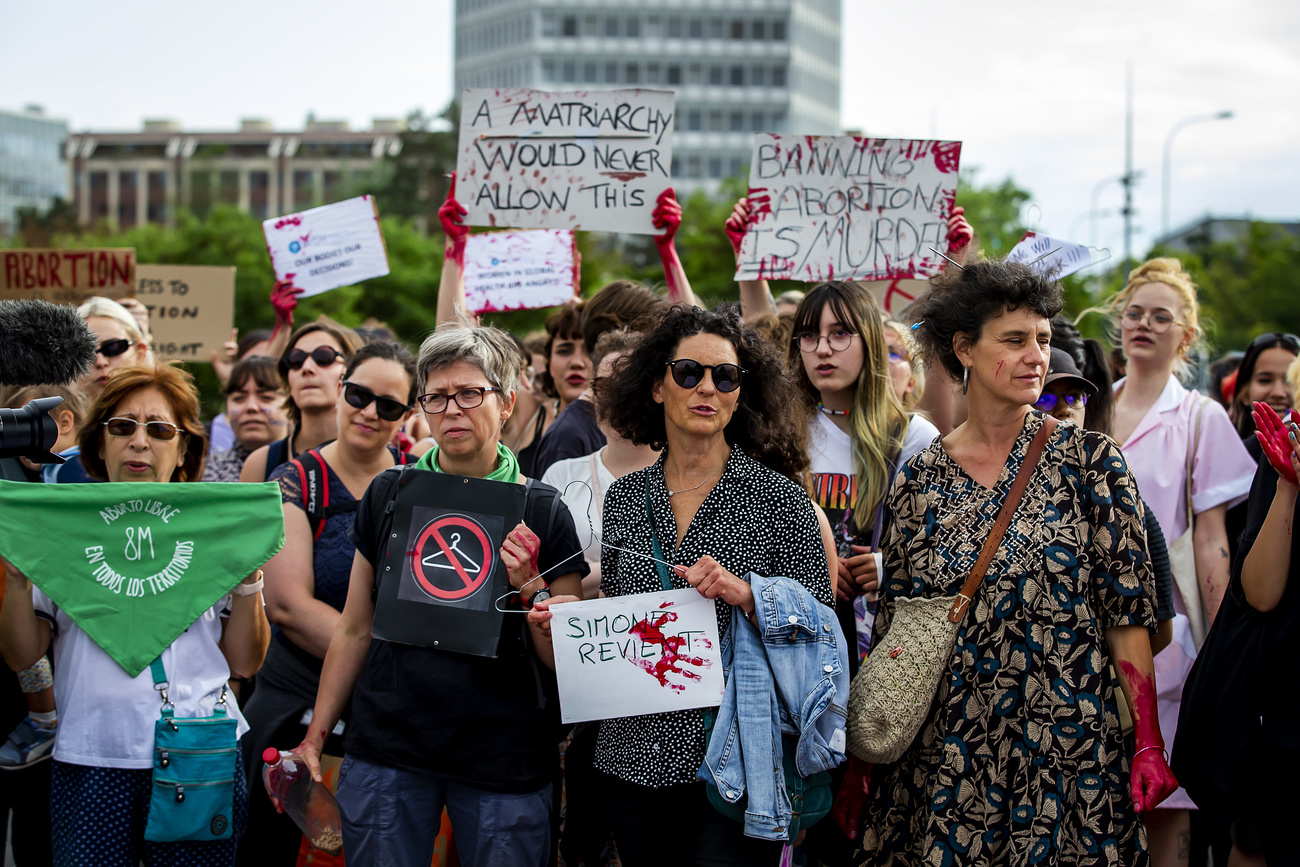
How abortion rights in Switzerland compare internationally

The recent decision by the United States Supreme Court to overturn the right to abortion has given the world pause. Here are some facts and figures on pregnancy terminations in Switzerland.
Last month the US Supreme Court scrapped the federal protection of abortion, reversing a decision made nearly five decades ago in the landmark Roe v. Wade case.
The new ruling does not make the voluntary termination of pregnancy illegal – it leaves it up to each state to decide whether or not to allow it. Several states have since criminalised abortion and over 20 US statesExternal link are expected to do the same soon. This about-turn has prompted some countries to re-examine their practice. Where do things stand in Switzerland?
What does the law say?
Abortion has been legal in Switzerland for 20 years. On June 2, 2002, over 72% of voters approved decriminalising abortion during the first 12 weeks of pregnancy. This decision put an end to decades of debate – a first attempt had narrowly failed at the ballot box in 1977.
The new rule, also called the “first-trimester solution”, came into force on October 1, 2002 and is enshrined in the Swiss Penal CodeExternal link. According to article 119, abortion in the first 12 weeks is exempt from penalty in situations where doctors can show a risk of “serious physical harm” to the pregnant woman or “at the written request of the woman who says that she is in a state of distress.”
What’s the situation in other countries?
Access to abortion is prohibited in about 20 countries. In some 100 others, it is possible under extremely restrictive conditions.
Over the past 25 years, more than 50 countries have liberalised their abortion laws, including recent advances in countries where the influence of the Catholic Church is strong, such as Ireland (2019), Argentina (2021), Mexico (2021) and Colombia (February 2022). But as the US Supreme Court decision shows, the right to abortion remains tenuous. Some countries have tightened their practices in recent years. Poland, for instance, banned abortion in the case of serious foetal malformation in 2020.
How does the Swiss abortion rate compare internationally?
At just over six abortions per 1,000 womenExternal link of childbearing age, the rate in Switzerland is very low. Recent model-based estimatesExternal link by the World Health Organization (WHO) and the Guttmacher Institute, an American research centre, show that Switzerland has one of the world’s lowest abortion rates, alongside Singapore.
According to Clémentine RossierExternal link, an associate professor at the Institute of Global Health at the University of Geneva, two factors in particular help to explain this trend: the “excellent sex education system” organised in schools from the earliest years and the “very good network of family planning centres” overseen by the organisation Sexual Health SwitzerlandExternal link.
Who has an abortion in Switzerland and under what circumstances?
In 2020, just over 11,000 women terminated their pregnancies in Switzerland, a minority of them teenagers, according to the Federal Statistical Office.
Four out of every ten abortions are performed on women of foreign nationality.
“The abortion rate is higher among foreigners, in particular because they often have not benefited from the same level of sex education as in Switzerland,” says Rossier.
In canton Vaud, which provides more detailed statistics than those available at the national level, recourse to abortion concerns all levels of society, even if some population groups are proportionally more exposed than others, according to the University of LausanneExternal link.
The vast majority of abortions (77%) take place during the first eight weeks of pregnancy, and nearly 20% between the ninth and 12th weeks. About 500 abortions (less than 5%) occurred beyond this time limitExternal link in 2020, mainly for medical reasons.
The abortion rate varies significantly by region, with urban areas the most affected – firstly because they have a higher concentration of women of childbearing age and/or foreigners, and secondly because rural areas tend to be more conservative.
Is the right to abortion under threat in Switzerland?
Anti-abortion sentiment exists in Switzerland and is represented primarily by religious groups and conservative right-wing parties, such as the Swiss People’s Party. As Rossier stresses, however, these are just a few groups. The situation in Switzerland, she adds, is nothing like in the United States, “where abortion has been totally politicised by both sides for the last 50 years and crystallises many other issues.”
Nevertheless, opponents of abortion are pursuing their objectives. Last December the People’s Party launched two popular initiativesExternal link. The first seeks to introduce a one-day reflection period before an abortion is performed. The second opposes late-term abortions and calls for a ban on pregnancy termination once “the child can breathe outside the womb.”
Although it is too early to know what voters make of these two texts, in recent decades all proposals to restrict the right to abortion have been swept aside. The most recent attempt, an initiative put forward by the People’s Party in 2014 to drop abortions from basic health insurance coverage, was rejected by nearly 70% of voters.
Edited by Samuel Jaberg/Translated from French by Julia Bassam/gw

In compliance with the JTI standards
More: SWI swissinfo.ch certified by the Journalism Trust Initiative































You can find an overview of ongoing debates with our journalists here . Please join us!
If you want to start a conversation about a topic raised in this article or want to report factual errors, email us at english@swissinfo.ch.